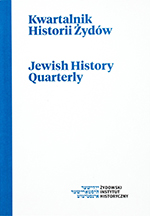Why Did the Events of March ’68 in Poland go Unnoticed by the Majority of Americans? Why the Purges of 1968 and Expulsion of Several Thousand Polish Jews Didn’t Cause a Strong Reaction within the American Jewish Community?
Why Did the Events of March ’68 in Poland go Unnoticed by the Majority of Americans? Why the Purges of 1968 and Expulsion of Several Thousand Polish Jews Didn’t Cause a Strong Reaction within the American Jewish Community?
Author(s): Andrzej KrakowskiSubject(s): Political history, Social history, Jewish Thought and Philosophy, History of Judaism
Published by: Żydowski Instytut Historyczny
Keywords: March ’68; United States; antisemitism
Summary/Abstract: Contrary to appearances, the US press informed its readers at length about the events taking place in Poland. After a period of decline in interest in Poland (following the expulsion of David Halberstam in 1965), from the day when Władysław Gomułka labelled the Jews as the “5th column”, The New York Times installed its new full-time correspondent in Warsaw. That was Jonathan Randall, who was transferred to Poland from Saigon. The abrupt relocation of such an experienced journalist from a country as important to the USA as Vietnam shows that the US press did not ignore the developments in Poland. From June 1967 to the end of 1969, The New York Times ran 2,065 articles that contained the word “Poland.”Compared to the local press, the new arrival had his advantages as well as disadvantages. The lack of knowledge of the Polish language did not help but the absence of censorship did. As a result, US readers were better informed about the current events than the Poles at home, who were fed a diet of chiefly tendentious and strongly censured reports of the Party-controlled media. When I started to look into the details of Randall’s wires from that time, I was shocked how much he knew despite the fact that he did not speak Polish and how he was able to anticipate the changes still to come. I suspect he had good sources not only in the American but also Polish intelligence. When I compare Randall’s reports with later events, I suspect that the seemingly spontaneous “March developments” (the strikes, protest rallies, beating up of students and workers) were organized and directed by the rulers. The Polish youth and the masses at large were not aware of it and were cynically abused by various groups of Communist politicians. The world in the pivotal year 1968 was in turmoil. Soviet-bloc armies marched into Czechoslovakia, the Vietnam war was triggering protests and sit-ins at university campuses in the USA and a polarization of the American society. The assassination of Robert F. Kennedy and Martin Luther King filled the streets with protesters. The lack of interest in the events in Poland can easily be explained by the distance. The developments in Poland were not spectacular, there was no shooting, no murders and the tens of thousands of Polish Jews forced to leave their homeland were nothing compared to the casualties suffered in Vietnam or the burning streets in the USA. The lack of response of the Jewish milieux in America to the expulsion of their compatriots from Poland was not so much the result of a fear of awakening antisemitic sentiments at home as of the stalemate in which they found themselves. The Americans saw the armed conflict between Israel and the Arab nations in June 1967 as the States’ “proxy” war with the USSR. Meanwhile, the handful of Jews who escaped the Holocaust and did not leave Poland when they could do it (in the 1940s or after 1956), were looked at as a Communist element, meaning hostile to the USA. Faced with a choice between ethnic community and the mother country, the majority of US Jews opted for loyalty toward the country in which they lived.
Journal: Kwartalnik Historii Żydów
- Issue Year: 270/2019
- Issue No: 02
- Page Range: 319-335
- Page Count: 17
- Language: English
- Content File-PDF

